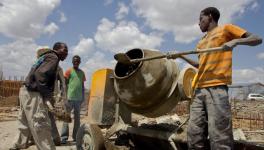Why Ukraine Referendum is a Big Deal
Russia’s newest ICBM Sarmat equipped with maneuvering warheads
The referendum on September 23-27 in the Donbass and southern Kherson and Zaporozhye regions of Ukraine on their accession to Russian Federation is, prima facie, an exercise of the right of self-determination by the native population who reject the Western-backed regime change in Kiev in 2014 and the ascendancy of extreme nationalist forces with neo-Nazi leanings in the power structure.
But it has other dimensions, too. In all probability, the referendum will overwhelmingly opt for accession to Russian Federation. In Donbass, it is a straightforward question: “Do you support the entry of the DPR into the Russian Federation as a subject of the Russian Federation?” For Kherson and the Zaporozhye Cossacks, the referendum ascertains three sequential decisions: secession of these territories from Ukraine; formation of an independent state; and its entry into the Russian Federation as a subject.
In 2014, all legal procedures for the admission of Crimea and Sevastopol to the Russian Federation were completed in four days. An expeditious process can be expected this time around too. There is huge mass support within Russia for reunification with the ethnic Russian populations in the eastern and southern regions of Ukraine that suffered severe persecution during the past eight-year period, including brutal violence, at the hands of extremist Ukrainian nationalist elements in control of the state apparatus. This is a highly emotive issue.
In the post-Cold War era, the genie of self-determination was first let out of the bottle by the West during the dismemberment of the former Yugoslavia. Although the US midwifed the secession of Kosovo from Serbia as far back as in 2008, the entity is yet to be accorded recognition by the UN. Serbia rejects the secession despite sustained western pressure.
That said, the Kosovo precedent will not stop the Western powers from condemning the accession of regions of Ukraine to the Russian Federation.
The big question today is about the Russian calculus. President Vladimir Putin has surely factored in that the accession of the “Russian regions” of eastern and southern Ukraine is an immensely popular decision in the domestic opinion. The most revealing comments on the topic have come from the former President Dmitry Medvedev.
Medvedev wrote in his Telegram channel: “Referendums in Donbass are of great importance not only for the systemic protection of the inhabitants of the LNR, DNR (Donbass) and other liberated territories, but also for the restoration of historical justice.”
In Medvedev’s opinion, these plebiscites “completely change the vector of Russia’s development for decades.” He adds, “And not only our country. Because after they (referendums) are held and the new territories are accepted into Russia, the geopolitical transformation in the world will become irreversible.”
Most important, Medvedev forewarns, “An encroachment on the territory of Russia is a crime, the commission of which allows you to use all the forces of self-defence.”
Furthermore, he says, once the process of annexation of the new territories is completed, “not a single future leader of Russia, not a single official will be able to reverse these decisions. That is why these referendums are so feared in Kiev and in the West. That is why they need to be carried out.”
What emerges is that Russia has given up hopes of any negotiated settlement. Moscow was initially optimistic that Kiev would negotiate, but the bitter experience turned out to be that President Zelensky was not a free agent. It is the Biden Administration that holds the stop watch for the proxy war. And Washington’s timeline is linked to the weakening and destruction of the Russian state, which has been the ultimate US objective. Lest we forget, Joe Biden played a seminal role in installing the new regime in Kiev in 2014 and in moulding Ukraine as an anti-Russian state.
Suffice to say, the referendum on Wednesday is Russia’s only available course of action under the circumstances, while Kiev maintains a maximalist position as advised by the US, UK and Poland.
The accession of Donbass, Kherson and Zaporozhye creates a new political reality and Russia’s partial mobilisation on a parallel track is intended to provide the military underpinning for it. The accession signifies a paradigm shift insofar as any further attacks on these regions that are part of Russia can be construed by Moscow as attacks on Russia’s territorial integrity and sovereignty.
Certainly, Kiev’s wanton attacks in future on civilians and civilian infrastructure in Donbass, Kherson and Zaporozhye will trigger Russian reaction. Any attack on them will be considered aggression and will give Moscow the right to respond “adequately.” The fact the Russian deployment in these territories will be significantly augmented and upgraded signals the willingness to use force.
Meanwhile, Russia’s special military operations will also continue until its set objectives are met. Which means, even more territories may come under Russian control, creating ever newer facts on the ground, whilst the track of dialogue has become extinct. And, of course, all this will be playing out at a juncture when Europe descends into recession, as the sanctions against Russia boomerang. It is improbable that the European public will want their governments to lurch toward a war with Russia. Kiev and its mentors in Washington and London need to factor all this very, very carefully.
The Pentagon spokesman Patrick Ryder has reacted as follows: “No one will take such bogus referendums seriously, and the US will certainly not recognise their results. How will this affect our and international support for Ukraine? This will not affect in any way, we will continue to work with Ukraine and our international partners to provide them with the necessary assistance to protect their territory.”
That is, admittedly, a sufficiently evasive statement couched in brave words. Neither Pentagon nor the Russian military command will risk brinkmanship. The likelihood, therefore, is that the accession of the new territories to the Russian Federation will not be militarily challenged by the US or NATO.
That said, Russia is already at war with the NATO, as Defence Minister Sergey Shoigu said, albeit not in terms of weapons supplies, which “we find ways to counter,” but in the Western systems that exist — communication systems, information processing systems, reconnaissance systems and satellite intelligence systems.
The point is, the accession of Donbass, Kherson and Zaporozhye regions to the Russian Federation is an irrevocable step that cannot and will not be undone for as long as Russian Federation remains an independent state, as Medvedev underlined. The US — and the Collective West and NATO — knows it. Plainly put, the NATO’s proxy-war algorithm has become obsolete and needs to be shelved as a museum piece.
The CIA’s analogy of the Afghan jihad of the 1980s does not hold good anymore, if it ever did at all. In effect, Russia has avoided a “quagmire” in Ukraine and is on its way to turn the table on the NATO.
In Putin’s national address on Wednesday, he had said: “In the event of a threat to the territorial integrity of our country and to defend Russia and our people, we will certainly make use of all weapon systems available to us. This is not a bluff.” Putin also said Russia has superior nuclear strike capability.
To make things doubly sure that the message has gone home, Moscow lifted the veil today on its newest ICBM, Sarmat. The results of the referendum must be determined not later than five days after the last voting day (September 27), and the issue of accession to Russia is considered approved if more than 50% of the plebiscite participants vote for it. Significantly, the Russian State Duma is scheduled to hold plenary sessions in Moscow on September 27 and 28.
MK Bhadrakumar is a former diplomat. He was India’s ambassador to Uzbekistan and Turkey. The views are personal.
Get the latest reports & analysis with people's perspective on Protests, movements & deep analytical videos, discussions of the current affairs in your Telegram app. Subscribe to NewsClick's Telegram channel & get Real-Time updates on stories, as they get published on our website.
























